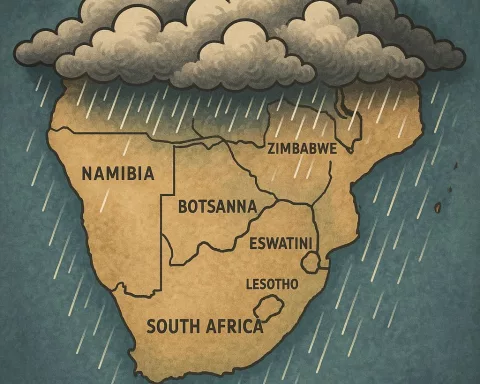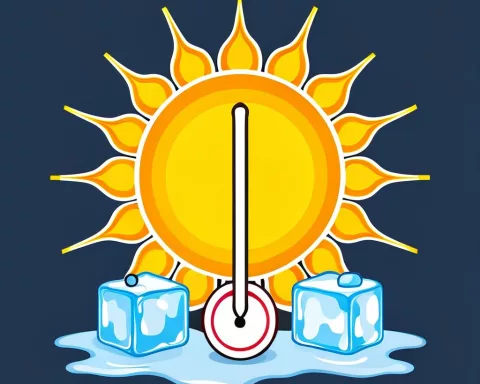South Africa’s Heritage Day long weekend was marked by severe flooding across the Western Cape, highlighting the critical issue of climate change and its impacts. The South African Weather Service issued a Yellow level two weather warning for scattered to isolated showers and thundershowers, with potential impacts including localized flooding and disruption of essential services. Despite the challenges, local communities have shown incredible resilience in the face of adversity, working tirelessly to restore stability and normalcy to the affected areas. The events underscore the urgent need to address climate change and build a more sustainable and resilient future.
South Africa’s Heritage Day long weekend proved challenging for many residents, as severe flooding occurred in multiple areas across the Western Cape. This extreme weather event highlighted the critical issue of climate change and the ongoing challenges posed by weather-related incidents. In this article, we will discuss the impacts of the heavy rainfall, the South African Weather Service (SAWS) warnings, and the ongoing recovery efforts in the region.
The Yellow Level Two Weather Warning
Following the disastrous flooding during the long weekend, SAWS issued a Yellow level two weather warning for scattered to isolated showers and thundershowers. This weather alert resulted from a ridging high-pressure system, anticipated to bring widespread showers and rain along the south coast from Friday into the weekend. The forecast predicted rainfall accumulations of 50 to 60mm (potentially reaching 70mm) in the Overberg municipality from Friday evening to Saturday.
Recovery Challenges and Weather Impacts
The region, already struggling from the previous cut-off low-pressure system, faced additional recovery challenges due to the new weather warning. Specific issues, such as drinking water and crop damage, emerged from the fast-flowing rivers. The warning, valid from 10 pm on October 6th, 2023, to midnight on Saturday, listed several potential weather-related impacts, including:
- Localized rockfalls and mudslides
- Localized failure of farm dam walls
- Challenging driving conditions on dirt roads and potential travel time disruptions on major roads
- Possible localized flooding of roads and settlements, both formal and informal
- Short-term disruption to essential services
Road Closures and Clean-Up Efforts
Authorities launched clean-up operations in the Overberg District in response to the extreme weather. However, numerous roads remained closed due to flooding and damage, affecting residents and travelers in the area. Some of the closed roads include:
- Buffelsjagrivier Bridge
- Chapman’s Peak
- Drew Bridge
- Hemel en Aarde, between Karwyderskraal and Hermanus
- Karwyderskraal to Caledon and Hermanus (access to local residents only)
- Malgas Pont
- McGregor to Robertson (alternative route available for vehicles with high ground clearance)
- N2 Caledon to Botrivier (long-term closure)
- R316 Bredarsdorp to Arniston
- R320 Caledon to Hermanus
- R321 Grabouw Vyeboom (stop and go for light vehicles only)
- R406 Greyton to Stormsvlei
- R44 Arabella to Grabouw
- R44 Clarence Drive, Kleinmond to Gordon’s Bay
- R44 Clarence Drive, Rooi-Els to Gordon’s Bay
- R45 Franschhoek Pass
- Robertson to McGregor
- Van Der Stel Pass
- Villiersdorp to Caledon via Draaiberg Road
- Buffelsjag to Riviersonderend
Community Resilience in the Face of Adversity
Despite facing difficult circumstances, local communities have demonstrated incredible resilience in the face of these extreme weather events. Residents and authorities have worked together to address the challenges caused by heavy rainfall, flooding, and subsequent road closures. As the recovery process continues, it is important to acknowledge the efforts of those working tirelessly to restore stability and normalcy to the affected areas.
In conclusion, the Heritage Day long weekend weather events have underscored the urgent need to address climate change and its impacts on our environment. The extreme weather patterns experienced in South Africa’s Western Cape have shown the vulnerability of communities to such incidents. As we continue to document the ongoing situation, it is essential to learn from these experiences and work towards building a more sustainable and resilient future.
1. What happened during South Africa’s Heritage Day long weekend?
Severe flooding occurred in multiple areas across the Western Cape, highlighting the critical issue of climate change and the ongoing challenges posed by weather-related incidents.
2. What weather warning was issued by the South African Weather Service (SAWS)?
A Yellow level two weather warning for scattered to isolated showers and thundershowers was issued. This weather alert resulted from a ridging high-pressure system anticipated to bring widespread showers and rain along the south coast from Friday into the weekend.
3. What were the potential weather-related impacts of the SAWS warning?
Potential impacts included localized flooding, challenging driving conditions, and short-term disruption to essential services.
4. What were the recovery challenges and weather impacts faced by the region?
Specific issues, such as drinking water and crop damage, emerged from the fast-flowing rivers. The region faced additional recovery challenges due to the new weather warning.
5. What roads were closed due to flooding and damage?
Numerous roads remained closed due to flooding and damage, affecting residents and travelers in the area. Some of the closed roads include Buffelsjagrivier Bridge, Chapman’s Peak, and Hemel en Aarde, between Karwyderskraal and Hermanus.
6. How did authorities respond to the extreme weather events?
Authorities launched clean-up operations in the Overberg District in response to the extreme weather.
7. How did local communities respond to the extreme weather events?
Despite facing difficult circumstances, local communities demonstrated incredible resilience in the face of these extreme weather events. Residents and authorities worked together to address the challenges caused by heavy rainfall, flooding, and subsequent road closures.
8. What does this situation underscore about climate change?
The Heritage Day long weekend weather events have underscored the urgent need to address climate change and its impacts on our environment. The extreme weather patterns experienced in South Africa’s Western Cape have shown the vulnerability of communities to such incidents.












